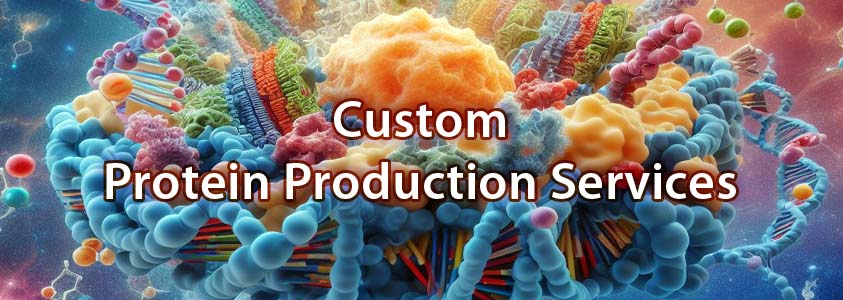
In the ever-evolving field of biotechnology, recombinant protein production has emerged as a cornerstone for groundbreaking research and medical advancements. This technique allows for the generation of high-quality proteins essential for drug development, diagnostics, and a myriad of research applications. In this blog, we’ll delve into the recombinant protein production process, its widespread uses, and how Abeomics' recombinant protein production services stand out in the industry.
What is Recombinant Protein Production?
Recombinant protein production involves the genetic manipulation of host cells to express proteins that they wouldn't naturally produce. The process typically begins by inserting a gene of interest into a host organism such as bacteria, yeast, insect, or mammalian cells, which then utilizes its own cellular machinery to express the protein. This technology has revolutionized the way researchers study biological systems and has enabled the large-scale production of proteins for therapeutic and industrial purposes.
The Procedure for Recombinant Protein Production
The recombinant protein production process can be broken down into several key steps:
-
Gene Cloning and Vector Construction
The process starts with the identification and isolation of the gene encoding the target protein. This gene is then cloned into a suitable expression vector that can be inserted into the host cell.
-
Host Selection
Depending on the type of protein and the application, a suitable host system is chosen. Common hosts include:
-
E. coli (for bacterial expression)
-
Pichia pastoris (for yeast expression)
-
SF9 insect cells (for baculovirus-based expression)
-
CHO cells (for mammalian expression)
-
Transformation or Transfection
The vector is introduced into the host cells through techniques like chemical transformation, electroporation, or viral transduction.
-
Protein Expression
Once inside the host cell, the recombinant DNA integrates into the host's genome or remains episomal, driving the production of the desired protein under optimal conditions.
-
Protein Purification
After expression, the protein is extracted and purified using chromatography techniques like affinity purification, ion-exchange, or size-exclusion methods to ensure that a high-purity product is obtained.
-
Quality Control and Characterization
The final product undergoes rigorous quality control, including SDS-PAGE, Western Blotting, mass spectrometry, and ELISA to confirm the protein's identity, purity, and biological activity.
Applications of Recombinant Proteins
Recombinant proteins have a wide range of applications across industries:
-
Therapeutics: Many life-saving drugs, including insulin, monoclonal antibodies, and growth factors, are produced through recombinant technology.
-
Vaccines: Recombinant proteins are used in vaccines, such as the hepatitis B vaccine, to trigger a protective immune response.
-
Research and Diagnostics: Proteins produced through recombinant methods are used as reagents, enzymes, and controls in various assays and diagnostic tests.
-
Industrial Enzymes: In fields like agriculture and environmental science, recombinant enzymes are essential for biocatalysis, food processing, and waste management.
Why Choose Abeomics for Recombinant Protein Production Services?
With over a decade of experience, Abeomics has established itself as a trusted leader in the field of recombinant protein production. Our services cater to a broad spectrum of industries, providing high-quality, custom-tailored proteins for research, diagnostic, and therapeutic applications. Here’s what sets our recombinant protein production services apart:
-
Customizable Solutions
At Abeomics, we understand that every project is unique. Our team of experts works closely with clients to design and optimize protocols for the expression and purification of custom proteins. Whether you need proteins expressed in bacterial, yeast, insect, or mammalian systems, we have the expertise to deliver.
-
High Yields and Purity
Using state-of-the-art technology, we ensure the production of high yields of recombinant proteins with superior purity and activity. We utilize advanced chromatography techniques and stringent quality control to meet the most demanding requirements.
-
Scalability
Whether you need a small amount for research purposes or large quantities for industrial applications, Abeomics offers scalable solutions that can grow with your project’s needs.
-
Cost-Effective and Time-Efficient
With facilities designed to minimize overhead costs, Abeomics offers affordable pricing without compromising quality. Additionally, our streamlined processes allow for faster turnaround times, ensuring you receive your product when you need it most.
-
Expert Support
Our dedicated support team includes experienced scientists who provide guidance at every step, from project design to troubleshooting. Abeomics is committed to ensuring that your project is a success.
Conclusion
Recombinant protein production is an indispensable tool in modern biotechnology, offering countless applications in research, medicine, and industry. Abeomics’ recombinant protein production services stand out by offering customizable, high-quality solutions that meet the specific needs of scientists and industries worldwide. With our expertise in various expression systems and our commitment to quality, Abeomics is your partner in driving innovation forward.
For reliable and scalable recombinant protein production services, contact Abeomics today to learn how we can support your research and development goals.







